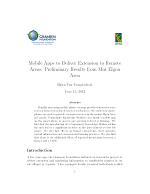Lessons Learned in Designing Online Education to Empower Women
January 02, 2020 by HABI Education Lab, Grameen Foundation content partner
In 2015, Grameen Foundation launched the Community Agent Network (CAN). Its goal was to improve the resilience of the financially unserved and underserved by building a last-mile network of Grameen Community Agents in micro and small neighborhood shops to provide digital financial services (DFS) to their neighbors in remote villages in the Philippines.




 Grameen Foundation announces the release of the operational overview report of Easypaisa, the largest branchless banking service in Pakistan. The report, commissioned by Grameen Foundation via the South Asian Micro-Finance Network (SAMN), identifies key factors that have enabled Easypaisa’s success.
Grameen Foundation announces the release of the operational overview report of Easypaisa, the largest branchless banking service in Pakistan. The report, commissioned by Grameen Foundation via the South Asian Micro-Finance Network (SAMN), identifies key factors that have enabled Easypaisa’s success. This study finds that the introduction of a Community Knowledge Worker within the area led to a signicant increase in the price farmers receive for maize. It also finds effects on farmer's knowledge, their attitudes toward information and extension and farming practices.
This study finds that the introduction of a Community Knowledge Worker within the area led to a signicant increase in the price farmers receive for maize. It also finds effects on farmer's knowledge, their attitudes toward information and extension and farming practices. This document explains our MOTECH project in Ghana and highlights key lessons learned by the project team as the system was being designed, developed and implemented. Although MOTECH is viewed as a “technology project,” the majority of the lessons learned are around operational issues, cultural components and operating with partners to make the project successful.
This document explains our MOTECH project in Ghana and highlights key lessons learned by the project team as the system was being designed, developed and implemented. Although MOTECH is viewed as a “technology project,” the majority of the lessons learned are around operational issues, cultural components and operating with partners to make the project successful. Prevailing wisdom holds that the ultra-poor are too poor to save money. This study examines the savings behavior of ultra-poor women served by the Livelihood Pathways for the Poorest project, which is jointly implemented by Grameen Foundation and the Livelihood School (part of BASIX group of companies), in Gaya District, Bihar, India.
Prevailing wisdom holds that the ultra-poor are too poor to save money. This study examines the savings behavior of ultra-poor women served by the Livelihood Pathways for the Poorest project, which is jointly implemented by Grameen Foundation and the Livelihood School (part of BASIX group of companies), in Gaya District, Bihar, India. In this study, Grameen Foundation reviews microfinance institutions' (MFIs) experiences with mobile financial services and assesses the challenges and opportunities faced during implementation.
In this study, Grameen Foundation reviews microfinance institutions' (MFIs) experiences with mobile financial services and assesses the challenges and opportunities faced during implementation.